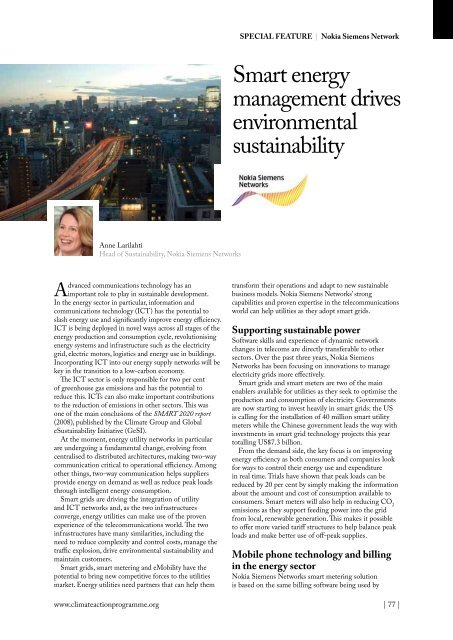Climate Action 2010-2011
Create successful ePaper yourself
Turn your PDF publications into a flip-book with our unique Google optimized e-Paper software.
SPECIAL FEATURE | Nokia Siemens Network<br />
Smart energy<br />
management drives<br />
environmental<br />
sustainability<br />
Anne Larilahti<br />
Head of Sustainability, Nokia Siemens Networks<br />
Advanced communications technology has an<br />
important role to play in sustainable development.<br />
In the energy sector in particular, information and<br />
communications technology (ICT) has the potential to<br />
slash energy use and significantly improve energy efficiency.<br />
ICT is being deployed in novel ways across all stages of the<br />
energy production and consumption cycle, revolutionising<br />
energy systems and infrastructure such as the electricity<br />
grid, electric motors, logistics and energy use in buildings.<br />
Incorporating ICT into our energy supply networks will be<br />
key in the transition to a low-carbon economy.<br />
The ICT sector is only responsible for two per cent<br />
of greenhouse gas emissions and has the potential to<br />
reduce this. ICTs can also make important contributions<br />
to the reduction of emissions in other sectors. This was<br />
one of the main conclusions of the SMART 2020 report<br />
(2008), published by the <strong>Climate</strong> Group and Global<br />
eSustainability Initiative (GeSI).<br />
At the moment, energy utility networks in particular<br />
are undergoing a fundamental change, evolving from<br />
centralised to distributed architectures, making two-way<br />
communication critical to operational efficiency. Among<br />
other things, two-way communication helps suppliers<br />
provide energy on demand as well as reduce peak loads<br />
through intelligent energy consumption.<br />
Smart grids are driving the integration of utility<br />
and ICT networks and, as the two infrastructures<br />
converge, energy utilities can make use of the proven<br />
experience of the telecommunications world. The two<br />
infrastructures have many similarities, including the<br />
need to reduce complexity and control costs, manage the<br />
traffic explosion, drive environmental sustainability and<br />
maintain customers.<br />
Smart grids, smart metering and eMobility have the<br />
potential to bring new competitive forces to the utilities<br />
market. Energy utilities need partners that can help them<br />
transform their operations and adapt to new sustainable<br />
business models. Nokia Siemens Networks’ strong<br />
capabilities and proven expertise in the telecommunications<br />
world can help utilities as they adopt smart grids.<br />
Supporting sustainable power<br />
Software skills and experience of dynamic network<br />
changes in telecoms are directly transferable to other<br />
sectors. Over the past three years, Nokia Siemens<br />
Networks has been focusing on innovations to manage<br />
electricity grids more effectively.<br />
Smart grids and smart meters are two of the main<br />
enablers available for utilities as they seek to optimise the<br />
production and consumption of electricity. Governments<br />
are now starting to invest heavily in smart grids: the US<br />
is calling for the installation of 40 million smart utility<br />
meters while the Chinese government leads the way with<br />
investments in smart grid technology projects this year<br />
totalling US$7.3 billion.<br />
From the demand side, the key focus is on improving<br />
energy efficiency as both consumers and companies look<br />
for ways to control their energy use and expenditure<br />
in real time. Trials have shown that peak loads can be<br />
reduced by 20 per cent by simply making the information<br />
about the amount and cost of consumption available to<br />
consumers. Smart meters will also help in reducing CO 2<br />
emissions as they support feeding power into the grid<br />
from local, renewable generation. This makes it possible<br />
to offer more varied tariff structures to help balance peak<br />
loads and make better use of off-peak supplies.<br />
Mobile phone technology and billing<br />
in the energy sector<br />
Nokia Siemens Networks smart metering solution<br />
is based on the same billing software being used by<br />
www.climateactionprogramme.org | 77 |












